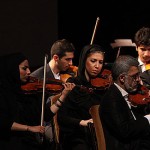Khosrow Djafarzadeh, musicologist and architect, who was also one of the main authors of HarmonyTalk journal passed away on 15 July 2019.
Tag Archives: Jafarzadeh
Latest posts
- Transition to Enlightenment: Six Lectures on Mozart’s String Quartets (5)
- Nasser Masoudi: The Voice of Gilan and a Legacy of Iranian Music
- Farhad Poupel: The Voice of the Shahnameh in the Orchestras Around the World
- Five Major Myths About Mozart’s Life
- Bahma Rajabi Passed Away!
- Reza Vohdani; Unveiling unpublished works, preservation of Iranian classical music
- Ahmad Pejman Passed Away!
- Timeless or Timely: The Role of Historical Context in Defining Artistic Value
- Leading the Charge in Censorship
- The Legacy of Khosrow Jafarzadeh
- Transition to Enlightenment: Six Lectures on Mozart’s String Quartets (4)
- Fereydoun Shahbazian, An Iranian Musical Icon Passed Away
From Past Days…

Five Major Myths About Mozart’s Life
Wolfgang Amadeus Mozart, the renowned Austrian composer, is undoubtedly one of the greatest geniuses in the history of classical music. However, his life is surrounded by numerous myths and legends, some of which are not based on facts. This article explores five of the most common misconceptions about Mozart’s life.

Transition to Enlightenment: Six Lectures on Mozart’s String Quartets (4)
The collaboration between Mozart and Haydn blossomed during the late 18th century in Vienna, a city that served as the epicenter of musical innovation. Amidst this vibrant cultural milieu, the two composers developed a profound friendship that extended beyond mere professional admiration. This connection is reflected in the six string quartets dedicated by Mozart to Haydn, aptly known as the “Haydn Quartets.”

Shaahin Mohajeri Wins UnTwelve Composition Competition
UnTwelve Non-profit Organization announced the results of its 2014/2015 composition competition on January 28, 2015. Shaahin Mohajeri, an Iranian Tonbak player, microtonalist, acoustician and composer, was awarded the second prize for his piece “Castle of Babak.”

The Structure of Kurdistan Daf (I)
Today, percussion instruments have such a high place in music that are an essential element of orchestras. This has attracted many people to this type of instrument with roots as old as the first humans. A historical study of music, shows that humans used the sound of these instruments to defend themselves against wild animals and, over time, for alerting each other, signaling their readiness and encouraging people for war, ritual ceremonies, dances, etc. in a manner that is still clearly visible in music and some ritual ceremonies.

Polyphony in Iranian Music (V)
In addition to the above-mentioned, polyphony can be also formed when a melody is performed by several singers in different ambiances or different sound registers according to their physiologic abilities. An example of this has been performed in rituals of Khanqah of Ghaderi darawish of Mahabad[i].

Interview with the Makers of the New Qeychak (II)
Regarding the classification of a new instrument in an instrument family, one can point to a number of fundamental issues, one of the most obvious of which is the instrument’s visual features. If we look at how the new instrument has changed compared to its historical versions, the set of visual elements that link the instrument to the Qeychak family becomes apparent. But other characteristics such as the geometric dimensions of the instrument, characteristics of the instrument’s various parts and how they relate to each other, its systematic performance, its sound range (compared to modern versions), the material and color of the sound, the way it is played and the like, can be considered in order to classify the instrument in the Qeychak family.

A Note on the Occasion of Houshang Zarif’s Demise
No introduction is needed when talking about the position of the late Houshang Zarif (1938-2020) in the Iranian music. His character and personality are so well-known among musicians that his name per se is a symbol and role model for the Iranian youth. “Becoming Houshang Zarif” is the dream of many young people who enter the world of music in Iran and many of whom retire regretting the realisation of this dream.

Women Musicians in Large Iranian Orchestras
It is more than a century now that the sociologists consider the presence of women in different social domains as a benchmark for a society’s progress. They analyze the presence of women in society by the means of available statistics. Unfortunately, as with regard to the Iranian society, statistics related to women’s engagement, has not been available to the researchers, if they existed at all.

Polyphony in Iranian Music (III)
In heterophonic variant, two performers perform a single melody simultaneously and change it. Performing and changing a single melody simultaneously by two performers leads to the coincidence of different voices.

Developments in Iranian Music Since Qajar Era (III)
Developments in Composing
Along with developments in the Iranian instruments, composition of the Iranian pieces developed as well. As a matter of fact, the developments of the two, mutually affected each other. In other words, instrumental developments led to developments in composition and vice versa.